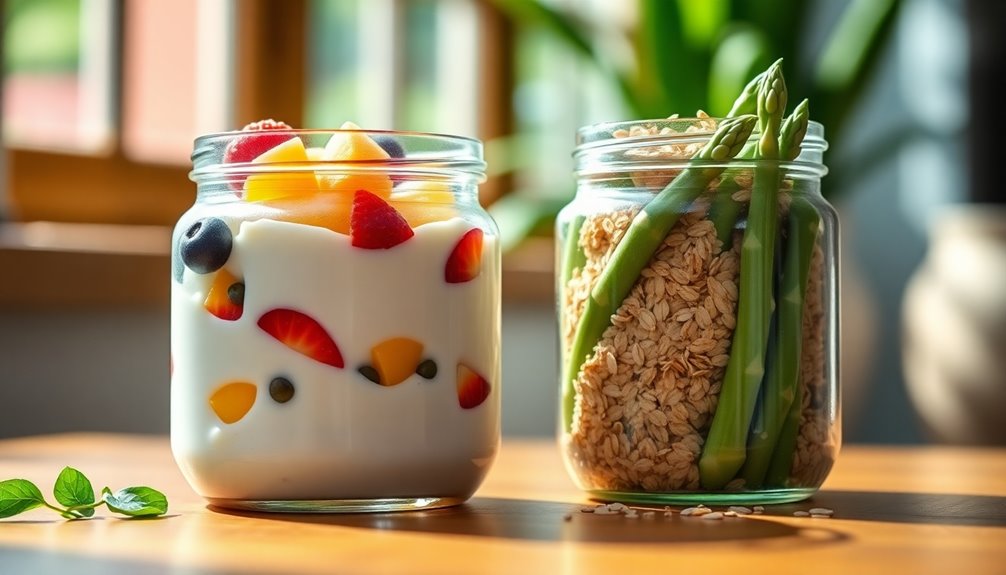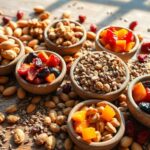Probiotics are live "good bacteria" found in foods like yogurt and sauerkraut, while prebiotics are non-digestible fibers in garlic and bananas that feed these beneficial bacteria. Probiotics help optimize gut health by improving digestion and boosting your immune system. Prebiotics support this process by enhancing the growth of those good bacteria and improving overall gut function. Both play crucial roles in maintaining a healthy microbiome, but they do so in different ways. Understanding how they work together can help you make informed dietary choices that benefit your well-being. You'll discover even more insights as you explore further.
Key Takeaways
- Probiotics are live beneficial bacteria found in fermented foods, while prebiotics are non-digestible fibers that nourish these bacteria.
- Probiotics help balance gut flora and inhibit harmful bacteria, whereas prebiotics promote the growth of beneficial gut bacteria.
- Probiotics support digestive health and immune function, while prebiotics improve gut health and regulate blood sugar levels.
- Common probiotic foods include yogurt and sauerkraut, while prebiotic sources include garlic, onions, and whole grains.
- Incorporating both probiotics and prebiotics in your diet enhances overall gut health and well-being.
Understanding Probiotics
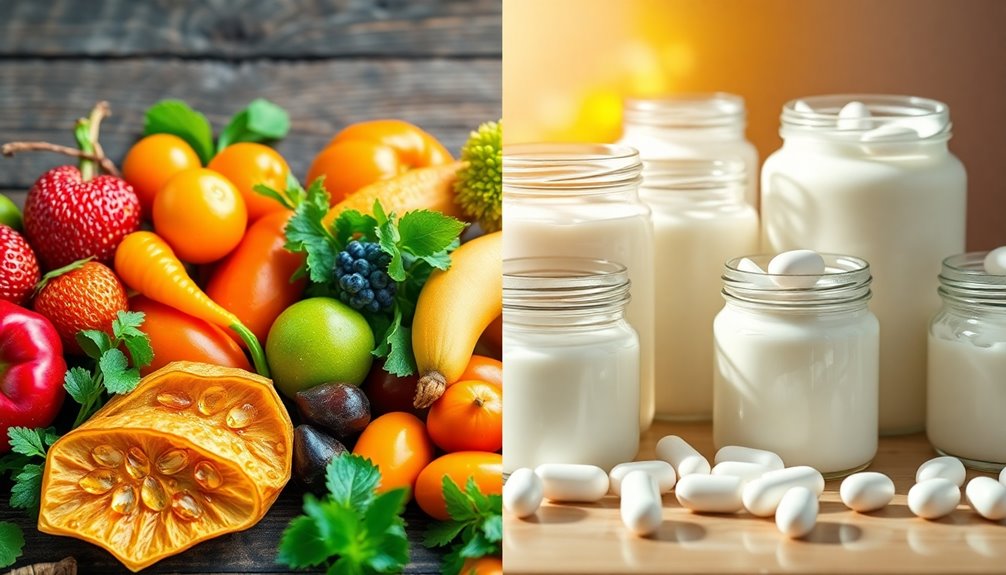
When it comes to gut health, understanding probiotics is vital. These live microorganisms, often referred to as "good bacteria," can play a significant role in maintaining a healthy microbiome balance. By integrating probiotics into your diet, you can support your digestive system and overall well-being.
Probiotics are typically found in fermented foods like yogurt, kefir, sauerkraut, and kombucha. They help restore and maintain the natural equilibrium of bacteria in your gut. This balance is fundamental since a healthy microbiome can impact your immune system, mood, and even weight management. When you consume probiotics, you're essentially introducing these beneficial bacteria to your digestive tract, where they can flourish and multiply.
Research shows that certain strains of probiotics may enhance gut health by preventing the growth of harmful bacteria, reducing inflammation, and improving nutrient absorption. For example, Lactobacillus and Bifidobacterium are two extensively studied strains recognized for their positive effects on digestion and gut health. Additionally, a diet low in traditional bread can help reduce gut inflammation and support a healthy microbiome.
It's important to note that not all probiotics are created equal, and their benefits can vary based on the strain and dosage. When selecting a probiotic supplement, seek products that offer a diverse range of strains and a high number of colony-forming units (CFUs) to maximize effectiveness.
Integrating probiotics into your daily regimen can cultivate a sense of belonging to a community of health-conscious individuals. By prioritizing your gut health, you're taking a proactive step toward nurturing your overall well-being.
Understanding Prebiotics
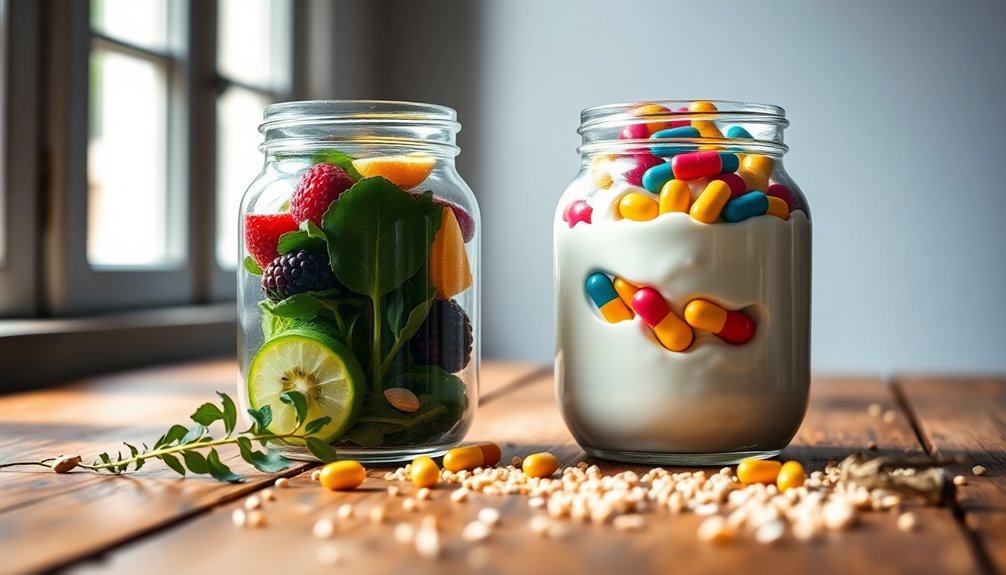
Probiotics flourish in your gut, but they need the right fuel to function effectively. That's where prebiotics come into play. Prebiotics are non-digestible fibers found in certain foods that act as nourishment for your beneficial gut bacteria. By consuming prebiotics, you're supporting the growth and maintenance of these probiotics, which ultimately enhances your gut health.
Foods abundant in prebiotics include garlic, onions, bananas, asparagus, and whole grains. These foods contain specific types of fiber, like inulin and fructooligosaccharides, that your digestive system can't break down. Instead, they reach the colon intact, where they're fermented by bacteria, promoting a healthy balance in your gut microbiome.
When your gut health is strong, it can lead to improved digestion and better overall well-being. A well-balanced gut microbiome can help reduce digestive issues like bloating, constipation, and diarrhea. Plus, emerging research suggests that a healthy gut may also play a role in your immune system and even mood regulation. Additionally, a plant-based diet is rich in fiber-rich foods that naturally support both prebiotics and probiotics.
Integrating prebiotics into your diet isn't just beneficial; it's essential for creating a flourishing environment for probiotics. By doing so, you're not only nurturing your gut bacteria but also fostering a sense of belonging within your body's ecosystem. So, consider adding prebiotic-rich foods to your meals and give your digestive system the support it deserves. Embracing prebiotics can lead to a happier, healthier you, and that's something we can all aim for together.
How Probiotics Work
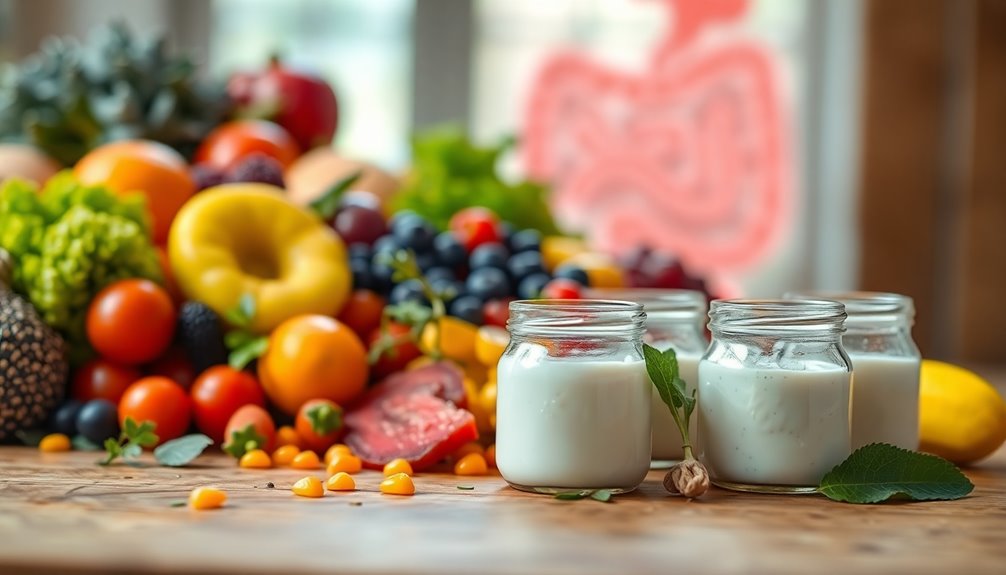
How do probiotics actually benefit your gut?
Probiotics are live microorganisms that can positively influence your gut bacteria, promoting a balanced microbiome. When you consume probiotics, whether through supplements or fermented foods like yogurt and kefir, these beneficial strains enter your digestive system, where they can help restore harmony among your gut bacteria.
Your gut plays a pivotal role in digestive health, and maintaining a diverse range of gut bacteria is crucial for peak function. Probiotics work in several ways to support this balance.
First, they can inhibit the growth of harmful bacteria by competing for resources and producing substances that deter pathogens. This means that by adding more good bacteria into your system, you're effectively crowding out the bad.
Additionally, probiotics can enhance the gut barrier's integrity. A strong gut lining helps prevent toxins and harmful substances from leaking into your bloodstream, which is essential for overall health. They also assist in breaking down food and synthesizing key nutrients, such as certain vitamins, helping to guarantee your body gets what it needs.
Lastly, probiotics can modulate your immune response. A healthy gut is closely linked to a robust immune system, making it easier for you to fend off illnesses. By integrating probiotics into your routine, you're not just investing in your digestive health; you're fostering a supportive environment for your entire body. Embracing probiotics can empower you to take charge of your health journey and feel more connected to your well-being. Furthermore, strong core strength can also contribute to overall health by enhancing stability and balance, which is crucial for digestive function core training benefits.
How Prebiotics Work
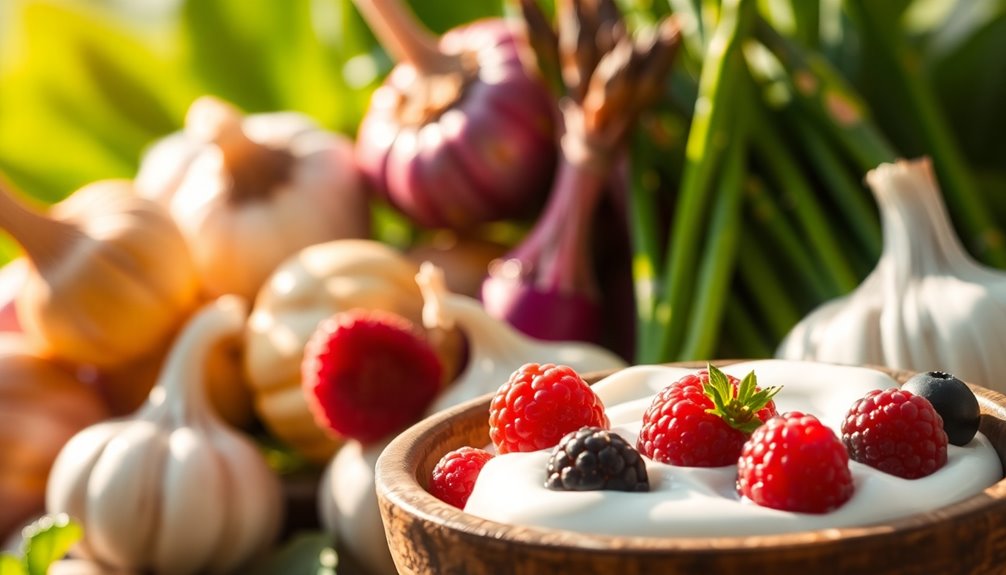
Prebiotics play a key role in supporting your gut health by serving as food for beneficial bacteria. These non-digestible fibers are found in various foods, such as fruits, vegetables, and whole grains. Once you consume prebiotics, they travel through your digestive system and reach the colon, where they ferment.
This fermentation process creates short-chain fatty acids, which are essential for maintaining a healthy gut environment.
When you nourish the good bacteria in your gut, you help them thrive and multiply. This balance of bacteria is vital for best gut health, as it can influence everything from digestion to immune function. A diverse microbiome—where beneficial bacteria outnumber harmful ones—promotes a robust digestive system. Prebiotics act as a catalyst for this balance, making them a key player in your overall health.
In addition to providing nourishment, prebiotics also help improve the gut barrier function. By reinforcing the lining of your intestines, they can prevent harmful substances from leaking into your bloodstream. This is crucial not just for gut health but for your overall well-being.
Incorporating prebiotic-rich foods into your diet can be an easy and effective way to support your gut. Foods like garlic, onions, bananas, and asparagus are excellent choices. By understanding how prebiotics work, you're taking a significant step towards fostering a healthier digestive system and enhancing your overall health. Additionally, a well-balanced diet that includes custom keto diet plans can further promote optimal gut health.
Health Benefits of Probiotics
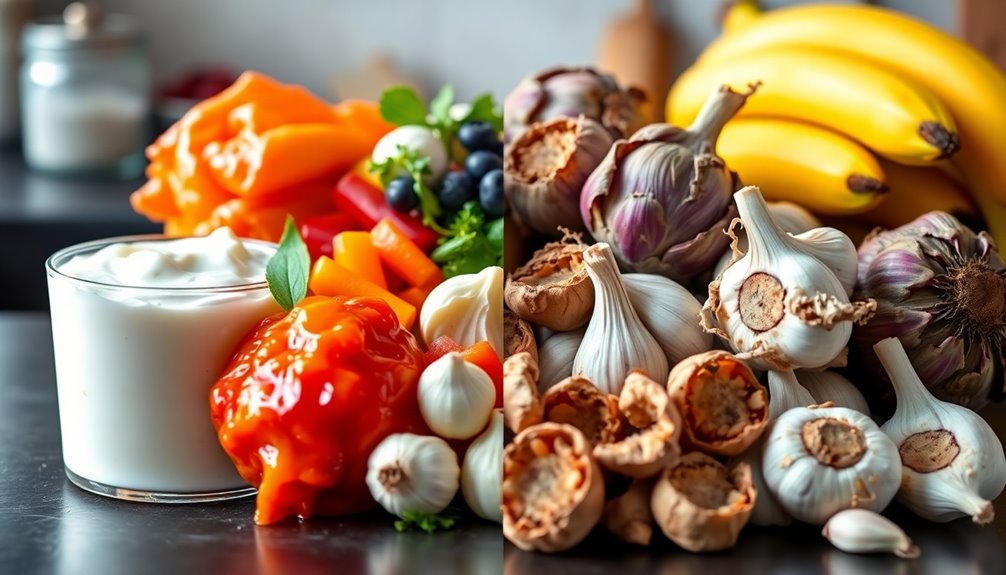
What makes probiotics such a powerful ally for your health? These beneficial bacteria play an essential role in maintaining gut health, which is foundational to overall well-being. When your gut microbiome is balanced, it supports not only digestive health but also enhances your immune system. Research shows that probiotics can help prevent and alleviate issues like bloating, constipation, and diarrhea, ensuring your digestive system runs smoothly.
Moreover, probiotics can aid in weight management. Certain strains of probiotics have been linked to a lower risk of obesity and can help regulate appetite by influencing hormones that control hunger. This means that incorporating probiotics into your diet could be a simple yet effective strategy for reaching your weight goals. In addition, a well-balanced diet that includes variety of delicious Keto recipes can further support gut health and overall wellness.
You might be wondering how to add these powerful allies to your daily routine. Fermented foods like yogurt, kefir, sauerkraut, and kimchi are packed with probiotics. Many people also opt for supplements for a more concentrated dose.
Whichever route you choose, making probiotics a staple in your diet can lead to lasting health benefits.
Health Benefits of Prebiotics
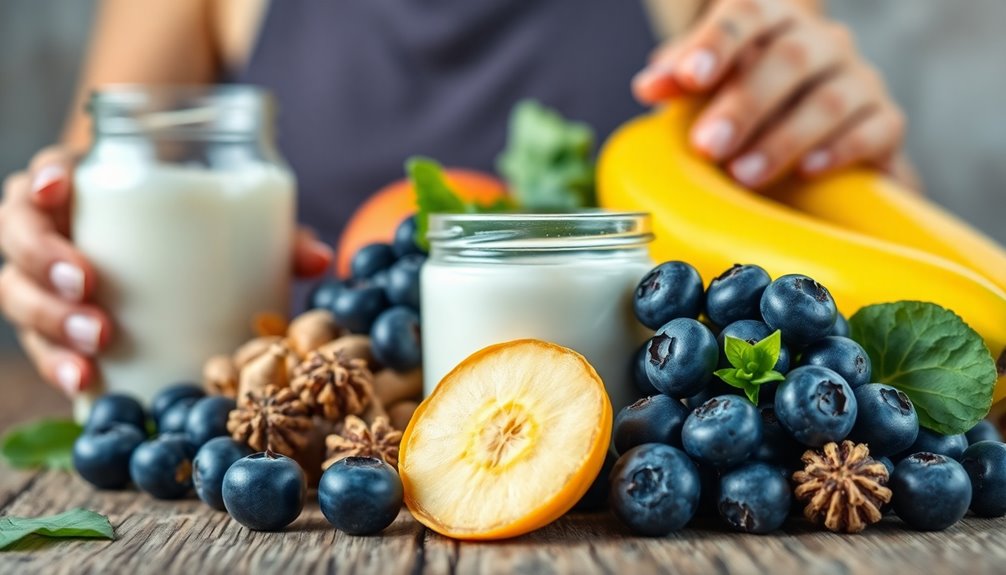
While probiotics are known for their direct role in supporting gut health, prebiotics serve as their food, promoting the growth and activity of these beneficial bacteria. Including prebiotics in your diet can notably enhance your overall well-being. They're primarily found in high-fiber foods, such as bananas, onions, garlic, and whole grains, which nourish the probiotics in your gut.
One of the main health benefits of prebiotics is their ability to improve gut health. By feeding the good bacteria, they help maintain a balanced gut microbiome, which is pivotal for digestive health. A well-functioning gut can lead to better nutrient absorption and may help reduce digestive issues like bloating and constipation.
Moreover, prebiotics play a critical role in supporting your immune system. Research shows that a healthy gut microbiome can enhance the immune response, making your body more resilient to infections. By consuming adequate amounts of prebiotics, you're not just feeding your good gut bacteria, but you're also fostering an environment where your immune system can thrive.
Additionally, prebiotics may help regulate blood sugar levels and improve heart health by lowering cholesterol levels. This multifaceted approach to health makes prebiotics an integral part of your diet. Embracing prebiotics can foster a sense of community within your gut, allowing you to feel your best both physically and mentally. Recent studies suggest that incorporating prebiotics can also lead to improved overall health and well-being. So, consider adding more prebiotic-rich foods to your meals, and watch how your body thanks you for it!
Food Sources of Probiotics
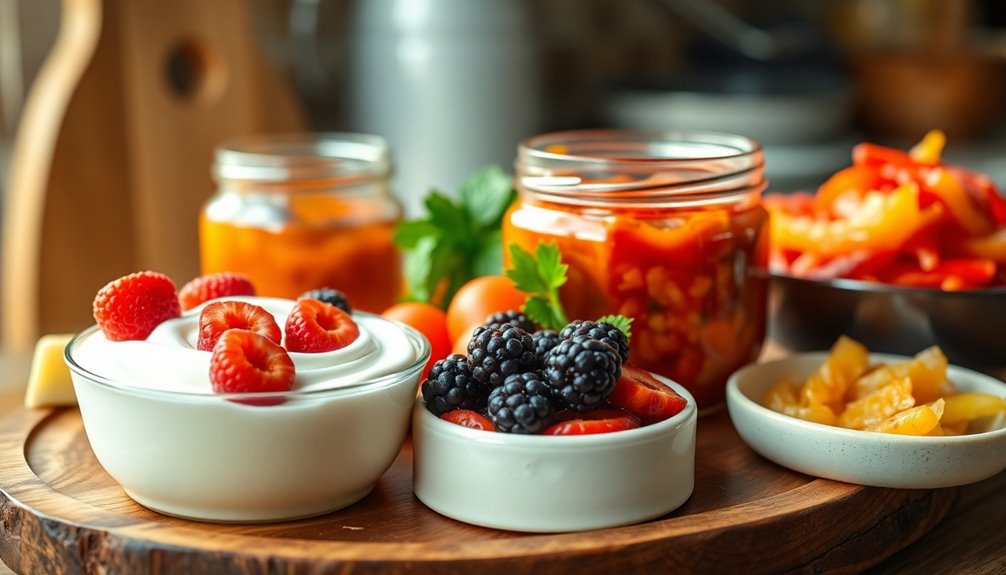
When it comes to enhancing your gut health, incorporating probiotic-rich foods into your diet is essential. Probiotics are live microorganisms that can provide health benefits, particularly when it comes to digestion and maintaining a balanced gut microbiome. One of the best ways to introduce probiotics into your daily routine is through fermented foods.
Fermented foods are rich in natural probiotics and can easily fit into meals or snacks. Yogurt is perhaps the most well-known source, packed with beneficial bacteria like Lactobacillus. When choosing yogurt, opt for those labeled "live and active cultures" to make sure you're receiving the probiotic benefits.
Kefir, a fermented dairy product, is another fantastic option. It's similar to yogurt but has a thinner consistency and a tangy flavor. If you're looking for dairy-free alternatives, try fermented plant-based options like coconut yogurt or almond milk kefir.
Sauerkraut and kimchi are excellent choices for adding probiotics to your plate while enjoying bold flavors. These fermented vegetables provide not only beneficial bacteria but also essential nutrients.
Additionally, miso and tempeh, both derived from soybeans, can be great sources of probiotics as well.
Lastly, don't forget about kombucha, a fermented tea that's effervescent and invigorating. It's an enjoyable way to hydrate while supporting your gut health. By incorporating these delicious fermented foods into your meals, you're taking an important step toward a healthier gut and overall well-being. Furthermore, adding these foods can complement your diet with whole food sources of protein that support your overall health and energy levels.
Food Sources of Prebiotics
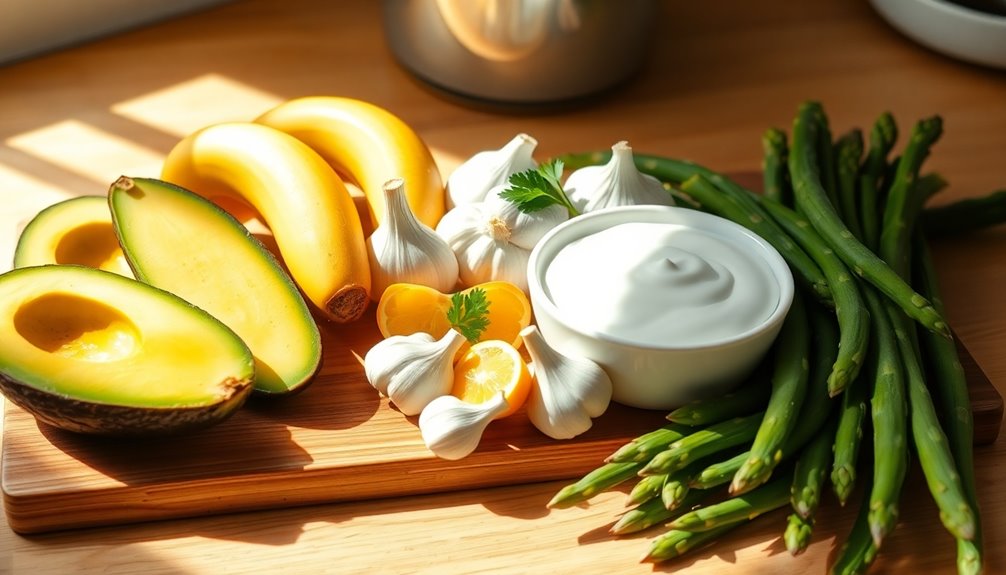
In addition to probiotics, incorporating prebiotics into your diet is essential for supporting gut health. Prebiotics are non-digestible fibers that feed the beneficial bacteria in your gut, enhancing their growth and activity. By including a variety of prebiotic-rich foods, you can optimize your fiber intake and improve overall digestive health.
Here's a quick overview of some excellent food sources of prebiotics:
| Food Source | Prebiotic Content |
|---|---|
| Garlic | Inulin |
| Onions | Fructooligosaccharides |
| Bananas | Resistant Starch |
| Asparagus | Inulin |
These foods not only provide essential nutrients but also help maintain a healthy balance of gut flora. Consuming garlic and onions can add flavor to your meals while delivering beneficial prebiotics. Bananas, especially when slightly green, offer resistant starch, which serves as a great energy source for your gut bacteria. Asparagus is another fantastic option, rich in inulin. Additionally, embracing a plant-based diet can further enhance gut health by introducing a variety of fiber sources.
Incorporating these prebiotic foods into your meals can be simple and enjoyable. You might try adding sliced bananas to your morning cereal or tossing some asparagus into your stir-fry. By focusing on these delicious options, you're actively contributing to your gut health and enhancing your overall well-being. So, don't hesitate to experiment and find what works best for you!
Choosing the Right Option
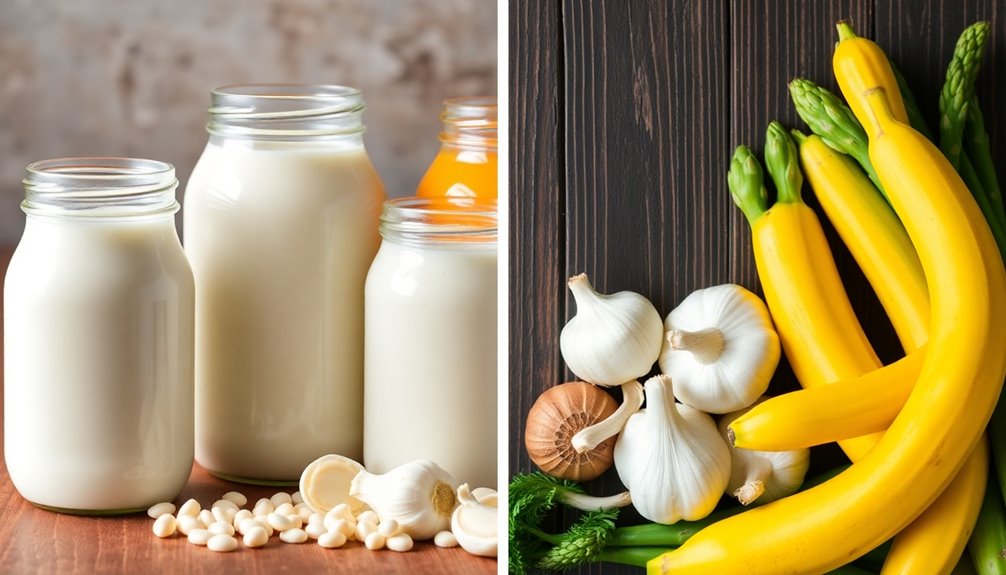
Choosing the right option between probiotics and prebiotics can significantly impact your gut health. Both play essential roles in maintaining digestive balance, but understanding your specific needs is key to making an informed choice. Here are some factors to ponder:
- Current Gut Health: Evaluate any digestive issues you're facing. Probiotics can help restore balance, while prebiotics fuel beneficial bacteria.
- Dietary Preferences: If you prefer food sources, consider prebiotic-rich foods like garlic or bananas. For supplements, look for specific strains of probiotics.
- Health Goals: Are you looking to enhance immunity, improve digestion, or manage stress? Different strains of probiotics cater to various health goals.
- Lifestyle: Busy schedules might make supplements more convenient, whereas whole foods require meal planning and preparation.
- Consultation: Always consult a healthcare professional for personalized advice, especially if you have underlying health conditions.
By evaluating these factors, you can determine whether probiotics or prebiotics better suit your needs. If you're experiencing gut issues, adding probiotics might be beneficial to restore your digestive balance. On the other hand, if you want to support the good bacteria already in your system, prebiotics are a great choice.
Ultimately, the best approach may include both probiotics and prebiotics for the most favorable gut health. They work synergistically, ensuring your digestive system functions well and thrives. Additionally, remember to stay hydrated, as drinking water plays a crucial role in overall health. Your journey to better gut health is personal, so take the time to explore and find what works best for you.
Frequently Asked Questions
Can Children Take Probiotics or Prebiotics Safely?
Yes, children can safely take probiotics and prebiotics, but it's best to consult a pediatrician first. Probiotics offer benefits like improved digestion and immune support, making them helpful for kids.
You can find prebiotics in sources like bananas, onions, and whole grains, which help nourish beneficial gut bacteria. By incorporating these into your child's diet, you promote a healthy gut and overall well-being, fostering a sense of belonging to a healthy lifestyle.
Are There Any Side Effects of Taking Probiotics?
So, you think popping probiotics is like taking candy? Well, hold your horses! While many enjoy the benefits, some might experience side effects, like bloating or gas, especially with certain probiotic strains or high probiotic dosages. It's important to find a balance that suits you.
Always start slow and listen to your body. Remember, it's not just about the "good bugs"; it's about giving them a cozy home in your gut!
How Do Probiotics Affect Mental Health?
Probiotics can greatly impact your mental health by enhancing the gut-brain connection. When you maintain a healthy microbiome balance, it can lead to improved mood and reduced anxiety. Studies suggest that these beneficial bacteria may influence neurotransmitter production, like serotonin, which plays a vital role in your overall emotional well-being.
Can I Get Enough Prebiotics From My Diet Alone?
Think of your gut as a garden; prebiotics are the fertilizer that helps it flourish.
You can absolutely get enough prebiotics from your diet, especially if you include foods like garlic, onions, and bananas. Aim for a daily intake of 25 grams from whole foods.
However, if you're struggling, supplement options can help bridge the gap. Just remember, nourishing your gut is key to feeling grounded and connected.
Is It Safe to Combine Probiotics and Prebiotics?
Yes, it's generally safe to combine probiotics and prebiotics. They work together to enhance gut health. Just make sure you're aware of the best dosage for each, as taking too much may lead to digestive discomfort.
While there are few reported potential interactions, it's wise to consult a healthcare professional if you have concerns, especially if you're on medication. Balancing them can help you maintain a healthy gut flora and overall well-being.
Conclusion
Think of your gut as a vibrant garden. Probiotics are the friendly gardeners, nurturing and maintaining a healthy ecosystem, while prebiotics are the nourishing soil, providing essential nutrients for those gardeners to thrive. Together, they create a flourishing environment that supports your overall health. By incorporating both into your diet, you're ensuring that your garden remains lush and vibrant, filled with the benefits of a balanced microbiome. Embrace both to cultivate a healthier you!

